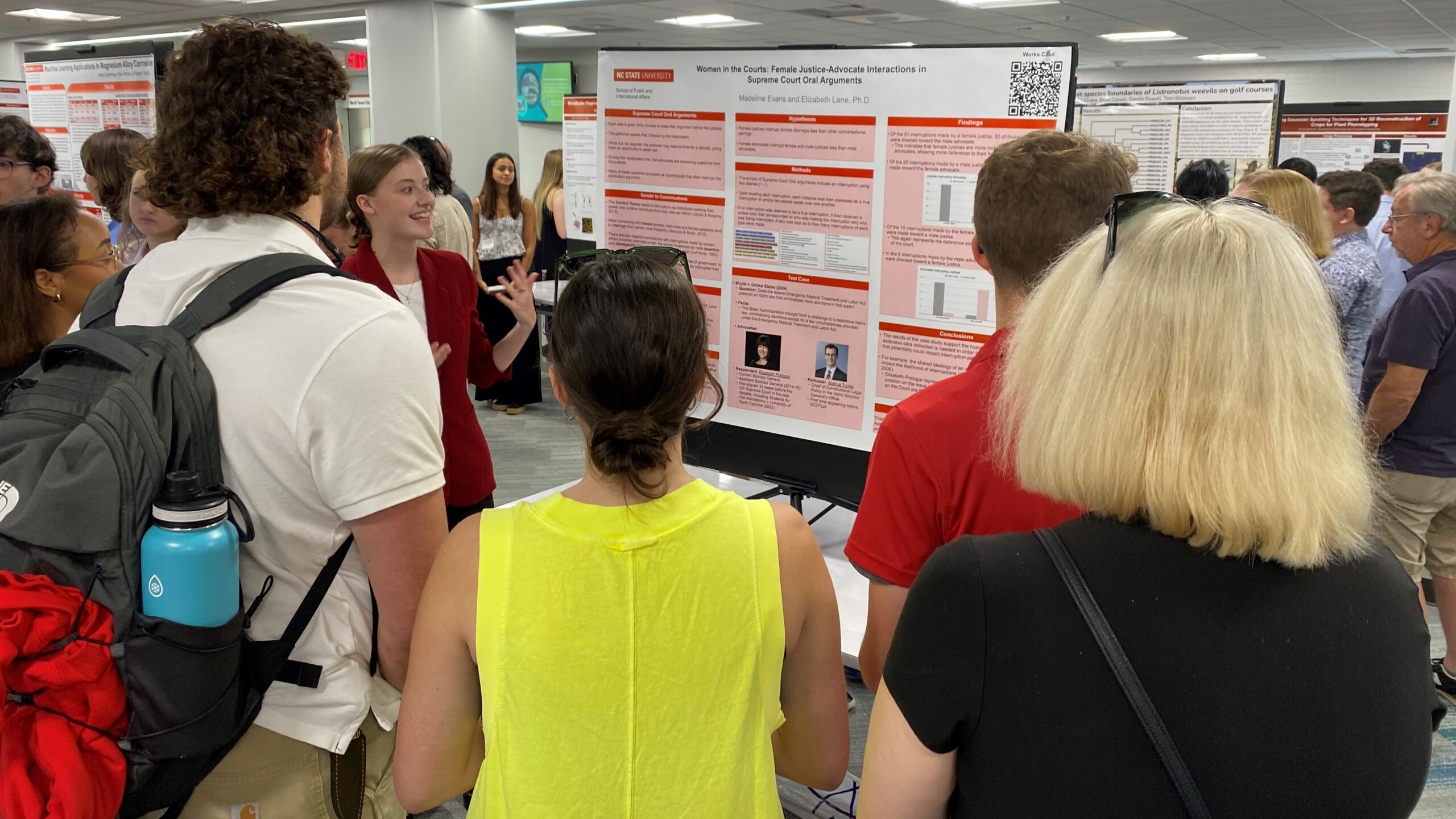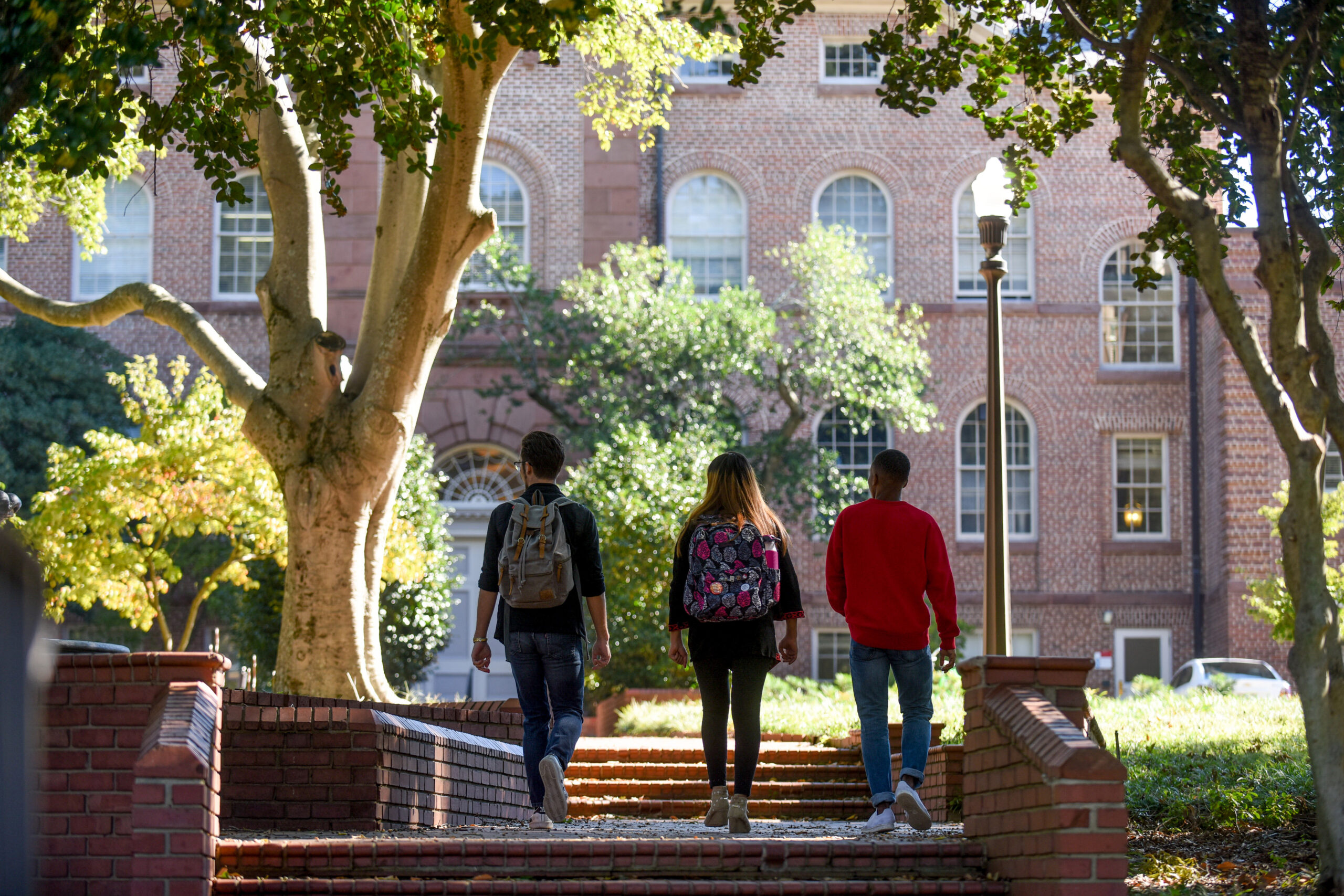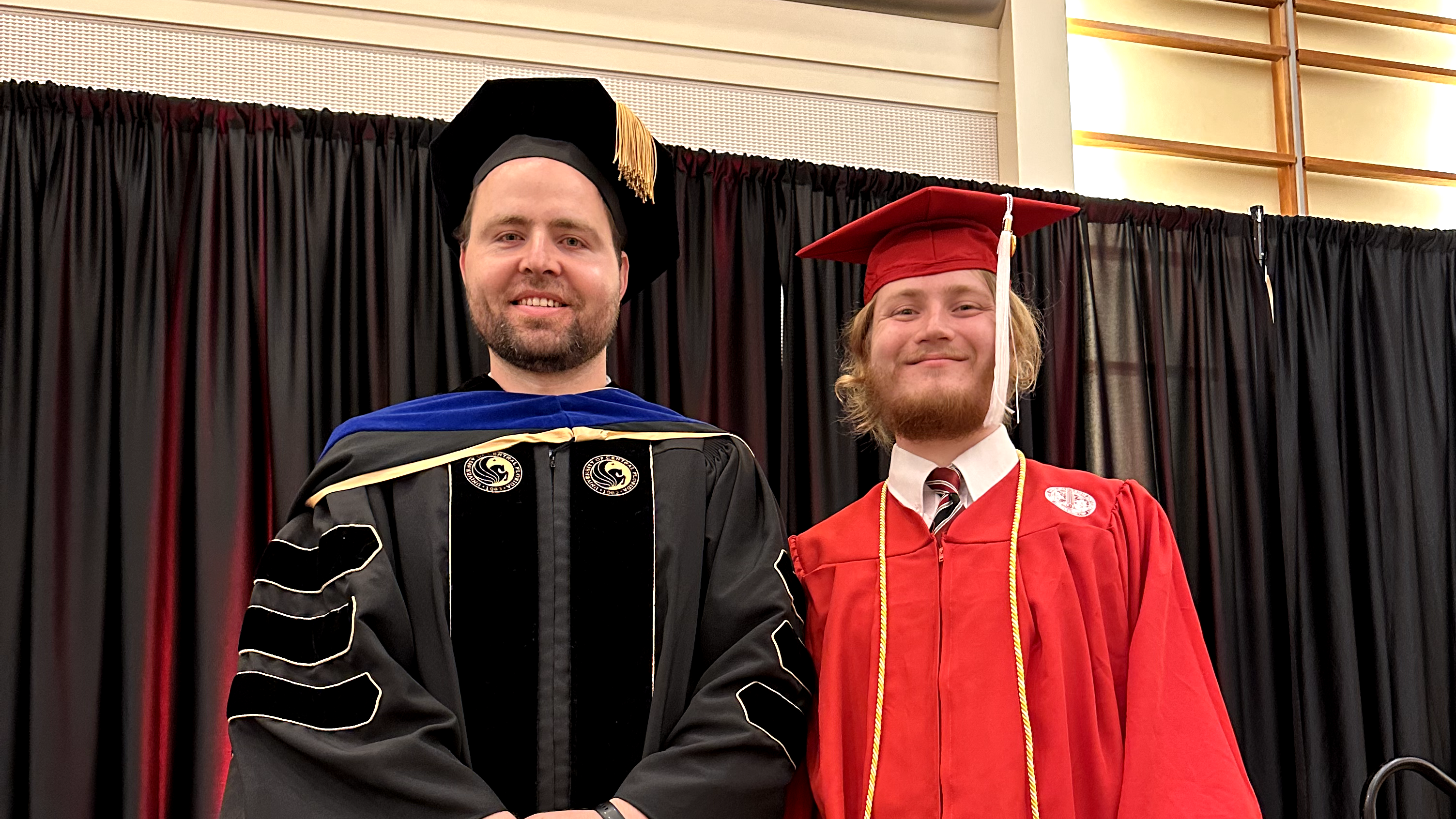Political science seniors—Ava Butler, Madeline Evans, and Connor Stitt —demonstrated their research prowess at the NC State Undergraduate Research & Creativity Symposium on July 26, 2024. This annual event, organized by the Office of Undergraduate Research, celebrates innovative undergraduate scholarship across diverse disciplines.
Butler, Evans, and Stitt were funded through the Summer Undergraduate Research Experience (SURE) grants from the School of Public and International Affairs (SPIA). Their success highlights SPIA and the Department of Political Science’s ongoing commitment to fostering undergraduate research excellence. In recent years, the department has significantly expanded opportunities for students, including increased funding, enhanced faculty mentorship, research assistantships, support for symposium and conference presentations, and enrollment in the Political Science Honors Program.
“Independent research is a demanding, time-consuming endeavor,” said Dr. Irwin Morris, SPIA’s Executive Director and the William T. Kretzer Distinguished Professor of Humanities. “SURE funding is one way SPIA has made it possible for dedicated students to execute mentored-research projects that can foster life-changing intellectual growth and professional development. My own academic career was profoundly shaped by a similar program during my college years.”
Meet the 2024 SPIA SURE student researchers:
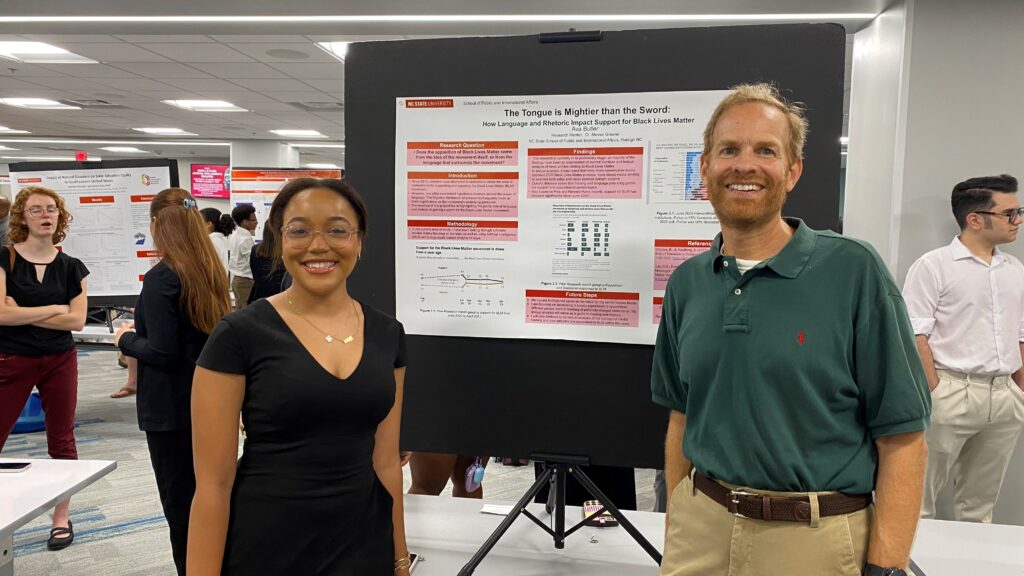
Ava Butler
Degree program: B.A. Political Science (public policy concentration) with minors in international studies and Japan studies.
Research Title: The Tongue is Mightier Than the Sword: How Language and Rhetoric Impact Opinions on Black Lives Matter.
What is your project about?
I am studying the language and rhetoric of the Black Lives Matter movement, specifically the media framing of the movement and the language used in those cases as well. Using AI to perform large-scale textual analysis and literature reviews on the links to language and emotional response, I plan to develop a survey to test if language and framing really are key factors to BLM opposition. My summer presentation was a summary of my literature review and text analysis. I will continue this project through the 2024-25 school year as my political science honors program work.
How did you become interested in this topic?
I have always been fascinated by how Black Lives Matter was such a contentious topic, especially after 2021. I was also thinking about how wording and phrasing can cause negative associations even if they’re not necessarily true/literal like “communist China” and “defund the police”. I wanted to see if this was the phenomenon that made opposition to BLM so strong. Originally, I wanted to test this topic in our PS 371 research class, but the topic fell out of the bounds of that particular class. I had not taken a class with Dr. Steven Greene, but knew of his expertise in public opinion research so I asked him to be my faculty mentor and he agreed. He’s very approachable.
What are your plans after graduation?
Through this summer experience, I have found a passion for research. I plan to work after graduation and am now strongly considering pursuing a Ph.D. in public policy.
Your advice to other students considering research?
Don’t be afraid to ask the faculty in the department that you don’t know. Look on the department website and see if their research interests align with your own. If they do, don’t be afraid to send them an email. Even if they can’t accommodate you, they’ll point you in the direction of another faculty member who can.
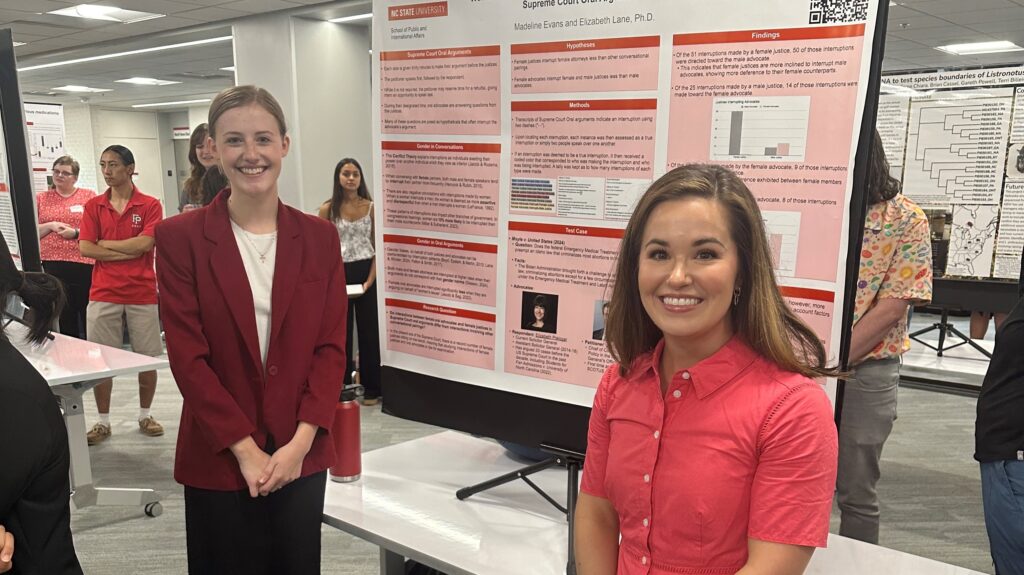
Madeline Evans
Degree program: B.A. Political Science (Law and Justice concentration) and B.A. Spanish Language and Literatures with minors in sociology, history, and international studies.
Research Title: Women in the Courts: Female Justice Advocate Interactions in Supreme Court Oral Arguments
What is your project about?
I am studying the way that female actors within the Supreme Court interact with each other in relation to other actors in the Court. There is so much research on how male actors within the Supreme Court treat other individuals, but it is just as important to study how women are treating each other. Since there are now four female Supreme Court Justices, there is so much data to examine. That’s why now is the perfect time to start this project and examine the relationship between female oral advocates and female justices.
How did you become interested in this topic?
I took PS 308 with Dr. Elizabeth Lane in which she assigned a podcast called More Perfect. The episode “Justice, Interrupted” examined interruption patterns by male justices and oral advocates that were directed toward female justices. I was fascinated by how much a pattern of interruptions could tell us about a justice’s thoughts and beliefs. During the entire episode, I kept waiting for them to explain what we could learn by female-to-female interactions. They never did, so I decided to find the answers to my questions through my own research project.
In addition to the class, I worked for Dr. Lane as her research assistant last year. Thankfully, she also agreed to be my faculty mentor for my research project which is part of the political science honors program. Working with her has been the highlight of my year! She has helped me learn so much about the law and my future career aspirations.
What are your plans after graduation?
I plan on attending law school after graduation and plan to become an attorney and, eventually, a judge. This research experience has solidified that this plan is the right choice for me.
Your advice to other students considering research?
Be curious. If there is a question that you want to explore, do it! You are adding to an entire body of literature, and your contribution is going to be important. I thought I was the only one interested in my research topic, but at the summer symposium I met so many people who also cared about my topic and are looking forward to seeing my results.
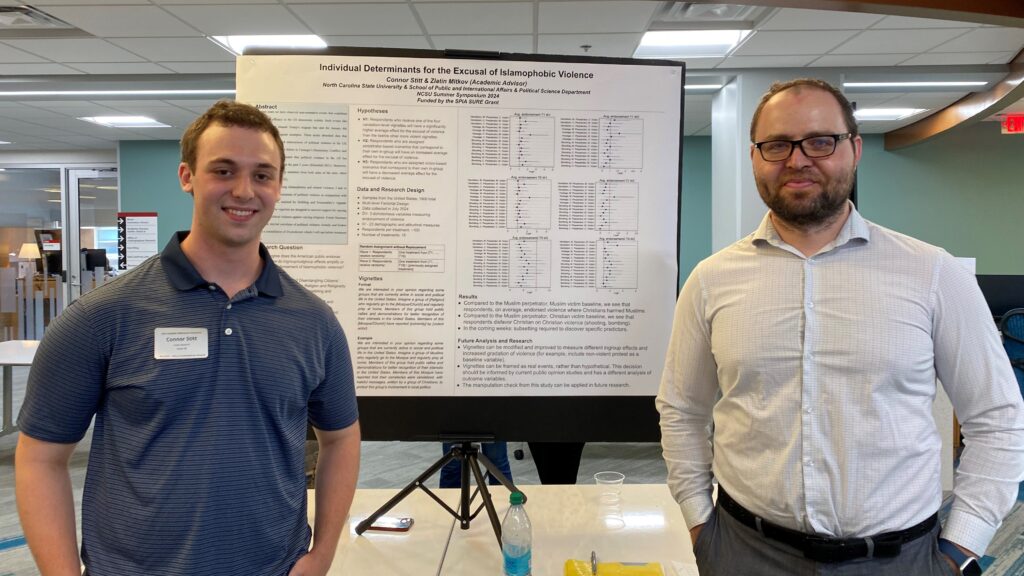
Connor Stitt
Degree program: B.S. Political Science with minors in mathematics and statistics.
Research Title: Individual Determinants for the Excusal of Islamophobic Violence
What is your project about?
We hear a lot about political violence in the news. We also hear about increasing polarization, xenophobia, and so on. These are disturbing issues. I wanted to get a reading on these issues myself. My study therefore focuses on answering the question: “what character traits increase the likelihood that people will support violent events, such as bombings or shootings?”
How did you become interested in this topic?
I transferred to political science from industrial engineering. I was eager to put my math skills to use in political science. I already knew I was interested in autocratic regimes; I found their heterogeneity and striking contrast to democracy interesting. However, after talking to Dr. Zlatin Mitkov, it became clear that it’s hard to conduct experimental research on autocrats at the undergraduate level. That conversation turned me toward political psychology and authoritarianism, which is easier to collect data on, and quickly segwayed into political violence, a related area. I read several papers on political violence which made it clear that there could be improvements to the methodology.
What are your plans after graduation?
My primary goal is to attend a master’s program to build a more well-rounded research portfolio on political violence and related subjects. This research project has increased my confidence in pursuing this goal. After graduate school, I hope to work as a political science analyst in Washington D.C..
Your advice to other students considering research?
If you want to pursue undergraduate research, I have three points of advice:
1. Topic: Start thinking about which areas of research interest you the most. Start looking into that area (Google Scholar, NCSU Library Databases) and learn the actual process of how people study that topic. For example, my research interested me both in its substantive content and its accessible methodology. Be on the lookout for “experiment” in the abstract or title.
2. Do your homework: After finding out the topic, spend some time beforehand studying by yourself and taking notes. This is not necessarily a requirement but it surely won’t hurt. I spent a couple of months before this project studying autocratic game theory before realizing it wasn’t worth it. Had I gone in with no practice, I may have gotten far into the project and felt lost.
3. Scope: You will not solve every issue in one paper. When I was constructing this project, I tried to include numerous other topics inside it. This will only dilute the results and is also unrealistic in the undergrad environment.
Students interested in doing their own research with a faculty mentor should talk with a political science professor about this course of study, enrollment in the research classes, and the Political Science Honors Program.
